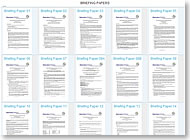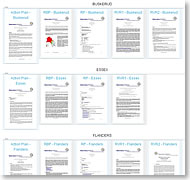RP - Gaborone
| Attachment | Size |
|---|---|
| RP_-_Gaborone.pdf | 42 KB |
Embedded Scribd iPaper - Requires Javascript and Flash Player
Observatory PASCAL
Place Management, Social Capital and Learning Regions PURE Regional Profile GABORONE, BOTSWANA Appendix 1 Region: Gaborone Region, Botswana Principal PURE contact: Peggy Gabo Ntseane Title: Professor Institutional base with full postal mailing address: The University of Botswana Contact Details: Email: Tel: Mob: [email protected] + (267) 3552266 or 3552067 (work)
Name of main collaborating region: Gaborone Region Suggested members of your Regional Co-ordinating Group (RCG) (between 3 and 5 Persons): Name, organisation and email: 1. Prof Gabo Ntseane 2. Prof A. Oduaran 3. City Mayor 4. Department of Business (at UB) representative 5. Department of Culture (Ministry of Home Affairs) Suggested Peer Reviewer from region: ‘Identity’ of Region (eg. governmental admin. region; special development zone; informal ‘working reality’ region, etc)
RP - Gaborone
http://www.obs-pascal.com/
P a g e |1
Observatory PASCAL
Place Management, Social Capital and Learning Regions REGIONAL PORTRAIT (Please list key issues of interest and relevance to PURE) (i) Approx. population and any key features: (e.g. new migrant numbers) 134,000 (census 2005). (ii) Other essential geographical features: Semi arid, capital city. (iii) Economy, industries and employment features: Semi-industrial, service, administrative, retail businesses, limited agricultural businesses (eg. horticulture), semi-arid. KEY ISSUES AND CHALLENGES CONFRONTING THE REGION (i) Economic issues: 1. Unemployment. 2. Limited citizen investment. 3. Inflation. Key websites for more information: 1. (ii) Social issues including health: 1. HIV / AIDS, orphans, street children, crime. Key websites for more information: 1. (iii) Environmental issues: 1. Refuse disposal challenges, traffic congestion at peak hours. Key websites for more information: 1. (iv) Cultural issues: 1. Modernization impacting negatively on traditional culture. Key websites for more information: 1.
RP - Gaborone
http://www.obs-pascal.com/
P a g e |2
Observatory PASCAL
Place Management, Social Capital and Learning Regions (v) Other issues or dimensions: (e.g. political & administrative, civic and participation) 1. Key websites for more information: 1.
UNIVERSITY AND OTHER HIGHER EDUCATION INSTITUTIONS (HEIs) PORTRAIT (Please describe in a few words the HE system operating in the region, in terms of any important matters, the following): (i) Structure, legal and financial status of HE system Two Universities, namely, the University of Botswana and Limkokwing of Creative Technology (one private and another public). (ii) Main priorities for the HEIs in the region Teaching, research and community engagement. (iii) Relevant recent changes and developments in policy and/or practice The New Botswana Tertiary Education Policy (2008) sees the university role as that of nurturing a knowledge society. (iv) Ways of organising and managing within the HEIs The public university, namely UB follows the Common Wealth traditions of organising and managing HE.
HEIs in REGION 1. University of Botswana 2. Limkokwing University of Creative Technology Gaborone Gaborone www.ub.bw www.limkokwing.ac.bw
RP - Gaborone
http://www.obs-pascal.com/
P a g e |3
Observatory PASCAL
Place Management, Social Capital and Learning Regions PURE Regional Profile GABORONE, BOTSWANA Appendix 2 Regional Aspirations and Agenda
1. What aspects of regional development and the role of higher education in particular do you wish to engage with, focus on and improve, through your involvement in PURE? (a) From the point of view of the region and its priorities, objectives and ways of working? Creative employment. Empowering of its human resources. Research and development that enhances the quality of the environment. (b) From the point of view of the higher education institutions and their priorities, objectives and ways of working? Teaching. Research. Community engagement. 2. In terms of the wider global, political, administrative, economic and environmental setting it was agreed at the PURE Glasgow working meeting (September 2008) that the following aspects (included in Briefing Paper No. 3) were of wide general significance for the PURE project as a whole: (a) What role are strong national and/or regional policies in favour of third mission playing to overcome barriers for PURE work in regions? New Tertiary Education Policy – UB is to support national systems. Long term Botswana national development strategy, namely, Vision 2016. (b) Will strong national and regional policies in favour of sustainable development have an impact on PURE activity on environmental issues? Yes. There is a general commitment by government to environment. (c) Will strong policies on implementing LLL at national and/or regional levels have an impact on PURE activities? (LLL = life long learning?)? Nothing as yet except a review. (d) Will strong national and/or regional innovation and research policies have as impact on PURE activities? Yes. Policy on National Science and Technology plan and the Botswana Innovation hub.
RP - Gaborone
http://www.obs-pascal.com/
P a g e |4
Observatory PASCAL
Place Management, Social Capital and Learning Regions (e) Will strong and/or regional policy on administrative and governance issues have an impact on PURE activities? Yes. The democratic system of government in Botswana opens access to participation in activities of PURE. (f) How is the third mission seen and developed, and how central is it to the future especially of nonelite universities? For UB, it is a key element of the strategic plan for 2009 – 2016. (g) Is the globalisation of the economy changing regions' ecological, social and cultural policies? If so, how will it impact on PURE activities in the region and the university? Not much, but ICT will certainly enhance the activities of PURE. 3. At this stage, do you have a clear sense which subject(s) of special interest you would like to concentrate on in a PURE regions sub-group; for example – ecotourism, SME development, megaevents like the Olympics, cultural development and creative arts, etc? We would be interested in the following sub-group specialism(s): Economics especially, innovation and SME. Culture especially the arts and culture engagement strategy. 4. Are there any other points that you wish to mention at this stage? UB’s impact on its immediate environment. For example, on how PURE can help UB develop the structural framework for making Gaborone a learning City. .
RP - Gaborone
http://www.obs-pascal.com/
P a g e |5
Observatory PASCAL
Place Management, Social Capital and Learning Regions PURE Regional Profile GABORONE, BOTSWANA Appendix 1 Region: Gaborone Region, Botswana Principal PURE contact: Peggy Gabo Ntseane Title: Professor Institutional base with full postal mailing address: The University of Botswana Contact Details: Email: Tel: Mob: [email protected] + (267) 3552266 or 3552067 (work)
Name of main collaborating region: Gaborone Region Suggested members of your Regional Co-ordinating Group (RCG) (between 3 and 5 Persons): Name, organisation and email: 1. Prof Gabo Ntseane 2. Prof A. Oduaran 3. City Mayor 4. Department of Business (at UB) representative 5. Department of Culture (Ministry of Home Affairs) Suggested Peer Reviewer from region: ‘Identity’ of Region (eg. governmental admin. region; special development zone; informal ‘working reality’ region, etc)
RP - Gaborone
http://www.obs-pascal.com/
P a g e |1
Observatory PASCAL
Place Management, Social Capital and Learning Regions REGIONAL PORTRAIT (Please list key issues of interest and relevance to PURE) (i) Approx. population and any key features: (e.g. new migrant numbers) 134,000 (census 2005). (ii) Other essential geographical features: Semi arid, capital city. (iii) Economy, industries and employment features: Semi-industrial, service, administrative, retail businesses, limited agricultural businesses (eg. horticulture), semi-arid. KEY ISSUES AND CHALLENGES CONFRONTING THE REGION (i) Economic issues: 1. Unemployment. 2. Limited citizen investment. 3. Inflation. Key websites for more information: 1. (ii) Social issues including health: 1. HIV / AIDS, orphans, street children, crime. Key websites for more information: 1. (iii) Environmental issues: 1. Refuse disposal challenges, traffic congestion at peak hours. Key websites for more information: 1. (iv) Cultural issues: 1. Modernization impacting negatively on traditional culture. Key websites for more information: 1.
RP - Gaborone
http://www.obs-pascal.com/
P a g e |2
Observatory PASCAL
Place Management, Social Capital and Learning Regions (v) Other issues or dimensions: (e.g. political & administrative, civic and participation) 1. Key websites for more information: 1.
UNIVERSITY AND OTHER HIGHER EDUCATION INSTITUTIONS (HEIs) PORTRAIT (Please describe in a few words the HE system operating in the region, in terms of any important matters, the following): (i) Structure, legal and financial status of HE system Two Universities, namely, the University of Botswana and Limkokwing of Creative Technology (one private and another public). (ii) Main priorities for the HEIs in the region Teaching, research and community engagement. (iii) Relevant recent changes and developments in policy and/or practice The New Botswana Tertiary Education Policy (2008) sees the university role as that of nurturing a knowledge society. (iv) Ways of organising and managing within the HEIs The public university, namely UB follows the Common Wealth traditions of organising and managing HE.
HEIs in REGION 1. University of Botswana 2. Limkokwing University of Creative Technology Gaborone Gaborone www.ub.bw www.limkokwing.ac.bw
RP - Gaborone
http://www.obs-pascal.com/
P a g e |3
Observatory PASCAL
Place Management, Social Capital and Learning Regions PURE Regional Profile GABORONE, BOTSWANA Appendix 2 Regional Aspirations and Agenda
1. What aspects of regional development and the role of higher education in particular do you wish to engage with, focus on and improve, through your involvement in PURE? (a) From the point of view of the region and its priorities, objectives and ways of working? Creative employment. Empowering of its human resources. Research and development that enhances the quality of the environment. (b) From the point of view of the higher education institutions and their priorities, objectives and ways of working? Teaching. Research. Community engagement. 2. In terms of the wider global, political, administrative, economic and environmental setting it was agreed at the PURE Glasgow working meeting (September 2008) that the following aspects (included in Briefing Paper No. 3) were of wide general significance for the PURE project as a whole: (a) What role are strong national and/or regional policies in favour of third mission playing to overcome barriers for PURE work in regions? New Tertiary Education Policy – UB is to support national systems. Long term Botswana national development strategy, namely, Vision 2016. (b) Will strong national and regional policies in favour of sustainable development have an impact on PURE activity on environmental issues? Yes. There is a general commitment by government to environment. (c) Will strong policies on implementing LLL at national and/or regional levels have an impact on PURE activities? (LLL = life long learning?)? Nothing as yet except a review. (d) Will strong national and/or regional innovation and research policies have as impact on PURE activities? Yes. Policy on National Science and Technology plan and the Botswana Innovation hub.
RP - Gaborone
http://www.obs-pascal.com/
P a g e |4
Observatory PASCAL
Place Management, Social Capital and Learning Regions (e) Will strong and/or regional policy on administrative and governance issues have an impact on PURE activities? Yes. The democratic system of government in Botswana opens access to participation in activities of PURE. (f) How is the third mission seen and developed, and how central is it to the future especially of nonelite universities? For UB, it is a key element of the strategic plan for 2009 – 2016. (g) Is the globalisation of the economy changing regions' ecological, social and cultural policies? If so, how will it impact on PURE activities in the region and the university? Not much, but ICT will certainly enhance the activities of PURE. 3. At this stage, do you have a clear sense which subject(s) of special interest you would like to concentrate on in a PURE regions sub-group; for example – ecotourism, SME development, megaevents like the Olympics, cultural development and creative arts, etc? We would be interested in the following sub-group specialism(s): Economics especially, innovation and SME. Culture especially the arts and culture engagement strategy. 4. Are there any other points that you wish to mention at this stage? UB’s impact on its immediate environment. For example, on how PURE can help UB develop the structural framework for making Gaborone a learning City. .
RP - Gaborone
http://www.obs-pascal.com/
P a g e |5








